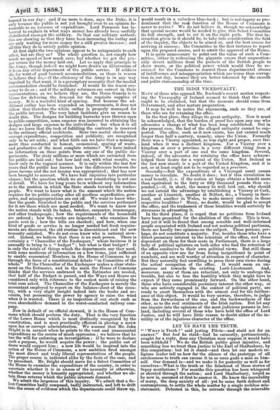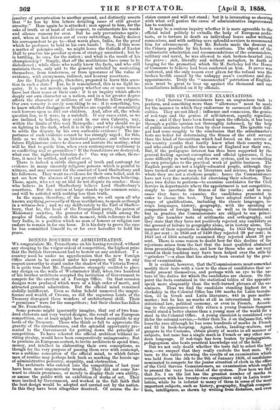LET US HAVE THE TRUTH.
"'WHAT is Truth ? ' said jesting Pilate—and staid not for an answer." But had he staid—had he earnestly, pertinaciously, sought for a reply, does any Christian man suppose it would have been withheld ? We do the British public great injustice, and something less we trust than justice to the Earl of Shaftesbury, by this comparison: but let it stand—and then let our modern re- ligious leader tell us how far the silence of the prototype of all carelessness to truth can excuse it in so unco gude a man as him- self. Our demand is—and we make it for posterity as well as for ourselves—What is the truth or the falsehood of these stories of Sepoy mutilations ? For months this question has been whispered or shouted through the nation ; and Lord Shaftesbury, torpid as he now is, assumed at first to answer it. He knew the incredulity of many, the deep anxiety of all: yet he came forth defiant and contemptuous, to settle the whole matter by a single reckless mis- statement. Detected in this, he retreats through the miserable
jesuitry of prevarication to another ground, and distinctly asserts that "he has by him letters detailing cases of still greater atrocity." Here again he is attacked ; men appeal to him, for the sake of truth or at least of self-respect, to substantiate his words and silence rumour for ever. But he only prevaricates again ; and, when at last driven out of every subterfuge, finally desires his correspondent to go to—that warm place, India, for the proof which he professes to hold in his own hands ! Now, if this were a matter of polemics only, we might leave the Goliath of Exeter Hall to practise his peculiar system of strategy unnoticed ; but he is battling, he says, for the nation ; and what is the result of his championship ? Simply, that all the mutilations have come to be disbelieved ; while those who really know the facts, and who still maintain them, only add to the general unbelief by contenting themselves, from tenderness, or from ignorance of the value of evidence, with anonymous, indirect, and hearsay assertions.
Are the English people, therefore, prepared to leave this ques- tion in such a state ? For, be it remembered, this is no light in- quiry. It is not merely an inquiry whether one or more women have lost their noses or their ears : it is an inquiry which affects deeply our own character as a nation, and in a far greater degree affects the character of millions of our Hindoo fellow subjects. Our own veracity is surely something to us : it is something, too, to know whether Brahnlins or Moulvies are capable of committing such horrors upon us and our children. And, after all, the whole question lies' as it were, in a nutshell. If any cases exist, as we are inclined to believe, they exist in our own Calcutta, nay, within the limits of this very Metropolis ; and why should we go on fighting in the dark, when it is in the power of a single witness to settle the dispute by his own authentic evidence ? The im- portance of such evidence cannot be too strongly urged ; for this, little as we think it, is an historical question ; and when some future Elphinstone comes to discuss and narrate the mutiny, what will he find to guide him, when even contemporary testimony is so conflicting and so groundless? If the foundations are destroyed, what can the righteous historian do ? One way or other, there- fore, it must be settled, and settled now.
There is indeed a subtle disregard of truth and contempt for evidence in many sincerely religious persons which is painful to witness, and may account for the conduct of Lord Shaftesbury and his followers. They want no evidence for their own belief, and do not see how the absence of it can prevent others from believing. Those, again, who set up an idol do not dispute its oracles : those who believe in Lord Shaftesbury believe Lord Shaftesbury's assertions. But the nation at large stands up for common sense, and will be satisfied with nothing less than truth.
In the name, therefore, of the nation, we call upon all who known anythingpersonally of these mutilations, to speak as though in a witness-box ; and we say deliberately to the Earl of Shaftes- bury, that he, the head of the Evangelical party, the patron of Missionary societies, the promoter of Gospel truth among the peoples of India, stands at this moment, with reference to that very India, in a Rosition which no man of honour or religion can endure to remain in for one hour. It is his duty to prove the ease he has committed himself to, or for ever hereafter to hold his peace.



































 Previous page
Previous page